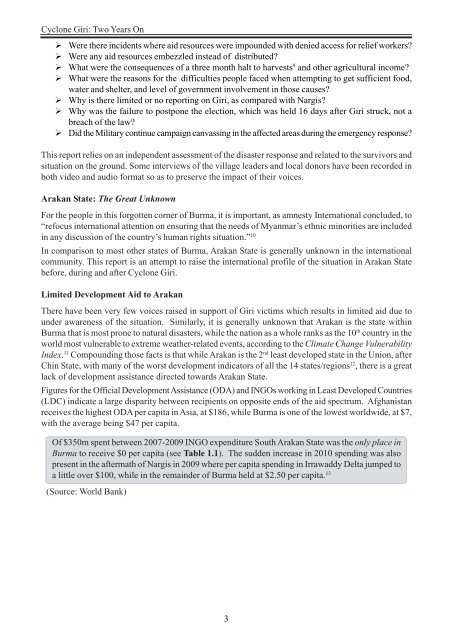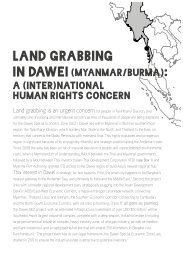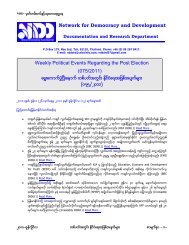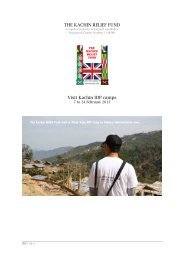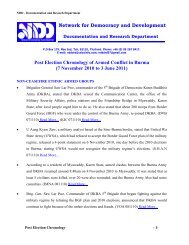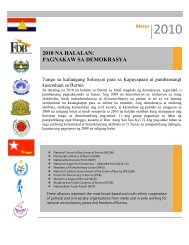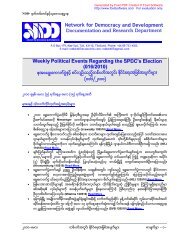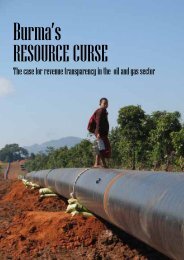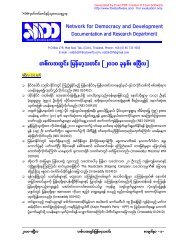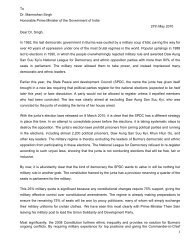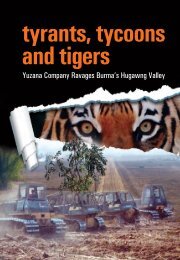Cyclone Giri - Two Years On - Burma Action Ireland
Cyclone Giri - Two Years On - Burma Action Ireland
Cyclone Giri - Two Years On - Burma Action Ireland
You also want an ePaper? Increase the reach of your titles
YUMPU automatically turns print PDFs into web optimized ePapers that Google loves.
<strong>Cyclone</strong> <strong>Giri</strong>: <strong>Two</strong> <strong>Years</strong> <strong>On</strong><br />
Were there incidents where aid resources were impounded with denied access for relief workers<br />
Were any aid resources embezzled instead of distributed<br />
What were the consequences of a three month halt to harvests 9 and other agricultural income<br />
What were the reasons for the difficulties people faced when attempting to get sufficient food,<br />
water and shelter, and level of government involvement in those causes<br />
Why is there limited or no reporting on <strong>Giri</strong>, as compared with Nargis<br />
Why was the failure to postpone the election, which was held 16 days after <strong>Giri</strong> struck, not a<br />
breach of the law<br />
Did the Military continue campaign canvassing in the affected areas during the emergency response<br />
This report relies on an independent assessment of the disaster response and related to the survivors and<br />
situation on the ground. Some interviews of the village leaders and local donors have been recorded in<br />
both video and audio format so as to preserve the impact of their voices.<br />
Arakan State: The Great Unknown<br />
For the people in this forgotten corner of <strong>Burma</strong>, it is important, as amnesty International concluded, to<br />
“refocus international attention on ensuring that the needs of Myanmar’s ethnic minorities are included<br />
in any discussion of the country’s human rights situation.” 10<br />
In comparison to most other states of <strong>Burma</strong>, Arakan State is generally unknown in the international<br />
community. This report is an attempt to raise the international profile of the situation in Arakan State<br />
before, during and after <strong>Cyclone</strong> <strong>Giri</strong>.<br />
Limited Development Aid to Arakan<br />
There have been very few voices raised in support of <strong>Giri</strong> victims which results in limited aid due to<br />
under awareness of the situation. Similarly, it is generally unknown that Arakan is the state within<br />
<strong>Burma</strong> that is most prone to natural disasters, while the nation as a whole ranks as the 10 th country in the<br />
world most vulnerable to extreme weather-related events, according to the Climate Change Vulnerability<br />
Index. 11 Compounding those facts is that while Arakan is the 2 nd least developed state in the Union, after<br />
Chin State, with many of the worst development indicators of all the 14 states/regions 12 , there is a great<br />
lack of development assistance directed towards Arakan State.<br />
Figures for the Official Development Assistance (ODA) and INGOs working in Least Developed Countries<br />
(LDC) indicate a large disparity between recipients on opposite ends of the aid spectrum. Afghanistan<br />
receives the highest ODA per capita in Asia, at $186, while <strong>Burma</strong> is one of the lowest worldwide, at $7,<br />
with the average being $47 per capita.<br />
Of $350m spent between 2007-2009 INGO expenditure South Arakan State was the only place in<br />
<strong>Burma</strong> to receive $0 per capita (see Table 1.1). The sudden increase in 2010 spending was also<br />
present in the aftermath of Nargis in 2009 where per capita spending in Irrawaddy Delta jumped to<br />
a little over $100, while in the remainder of <strong>Burma</strong> held at $2.50 per capita. 13<br />
(Source: World Bank)<br />
3


